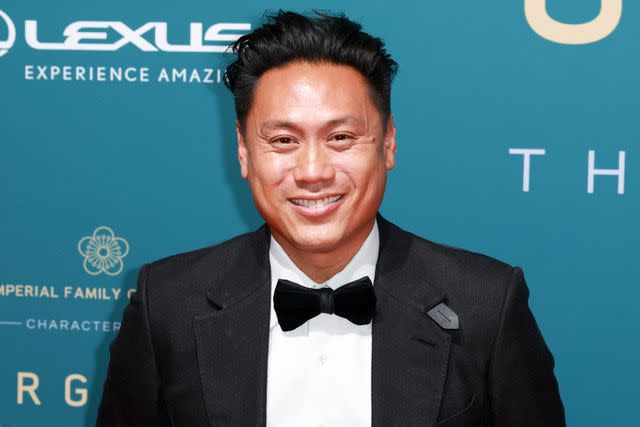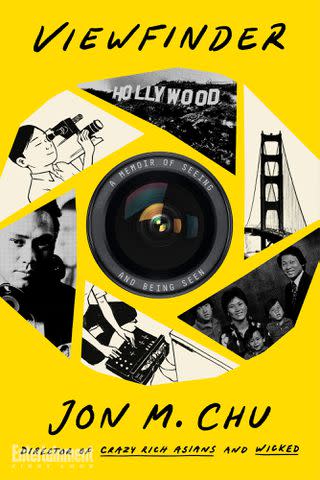Director Jon M. Chu to release memoir “Viewfinder” this summer (exclusive)

"The American dream is changing, but there is still an inspirational story to be told that dreams absolutely can come true," Chu tells EW. "It's just not as simple as maybe our stories make it."
Jon M. Chu is getting ready to drop a major new creative endeavor.
No, it's not Wicked (though that's on the way too), but a memoir, which Entertainment Weekly can exclusively announce. Viewfinder, which he co-wrote with Jeremy McCarter (Hamilton: The Revolution), will hit shelves on July 23. The book follows Chu's story from his growing up in Silicon Valley to his film school days at USC and his time making splashy films like Crazy Rich Asians and In the Heights.

Elyse Jankowski/Variety via Getty
Jon M. ChuChu describes it as a memoir meets guidebook for aspiring storytellers. "It's a book I wish I had as a young creative," he says. "My journey was so unique growing up in Silicon Valley and coming to Hollywood as these two mammoth industries collided and exploded. There's a collision of technology and entertainment, and I literally lived in the intersection of the cultural changes that happened. And then the number one question I get asked is, 'How I got in, starting in a little Chinese restaurant holding napkins for my parents all the way to here?' I want to give this next generation of creators a little bit of a guide of how it went for me. And hopefully they can find their voice through all of that."
EW caught up with Chu to talk more about the book, how it helped him while making Wicked, and why The Wizard of Oz has its fingerprints all over the text. Check out the cover below and read more from Chu.
ENTERTAINMENT WEEKLY: I love that your epigram is from The Wizard of Oz. Why did you choose that? Was it just because of Wicked?
JON M. CHU: The Wizard of Oz always been a big part of my life. It's the biggest American fairytale. Most fairytales are from overseas and being the child of immigrants, the story of America was so strongly embedded in me — that you can do anything. You can work hard and one day America will give you your dreams. There's this yellow brick road and there's this wizard at the end of it that's going to give you all your hopes and your dreams and your heart's desire. Where we are now, the yellow brick road doesn't necessarily exist. It's off the beaten path that you find yourself, and there's no wizard on the other side who's going to give it to you all. We have to figure it out together. That's part of the big journey that I had. At some point, I had to let that go and find my own story and what works for me and my children. The American dream is changing, but there is still an inspirational story to be told that dreams absolutely can come true. It's just not as simple as maybe our stories make it."
How did you figure out the structure of the book — looking through the viewfinder and making that your title and then starting with your childhood, going through your time at USC, and how much of your career you wanted to include?
I felt compelled to make it when I met Jeremy McCarter. We were working on In the Heights and he was doing an In the Heights book. He did the Hamilton book and he was front row to a change in culture with that show. We got to know each other, and I started talking to him about my life. After Crazy Rich Asians and In The Heights, my whole life changed about what I want my art to reflect and what I want my stories to be. My whole life I looked out through the viewfinder when it was put in my hands, and it gave me a way to interact with the world. But at a certain point, I had to turn it back on myself. I had to look back at my life and all the stories I was told and try to figure out what my parents were going through when we were born and how they met and my own journeys to find that. This was all during the pandemic, and all these questions were blowing up our world and streaming was really taking hold. I realized to have this front seat to this change across the world, to see it at such a personal level would be something that would be very helpful for others.
It was trying to process everything up to this point. How did this happen? How did what I dreamt about on my bedroom floor with my toys actually come true? Because I think there's a lot of lost hope out there right now. A lot of people are confused. And because I got through it, I just want people to know you can dream. You should dream. It may not be the sparkly thing that we always present it to be, but it can happen. Even in this chaos of change, the only way out is through. The making of the book was a process in itself of looking back to piece together my view of myself.

Random House
'Viewfinder' by Jon M. ChuFrom the beginning, you establish this juxtaposition between technology and creativity and filmmaking. How essential is the intersection of those two things in your life to your story and how do you think we can use technology in the entertainment industry productively instead of negatively going forward?
The biggest benefit of growing up in the Silicon Valley was change was constant. In my parents' restaurant, I was hearing everything everyone was attempting and their companies could close, but it didn't matter. The idea of changing the world was so prevalent. There was this idea that technology was going to save us; it could help us find each other and bring us together. It was like electricity turning on in the entire world where suddenly the nerve endings connected and now we're all face-to-face, and we're all roommates. And because I grew up in the Silicon Valley, these were just tools to help human beings connect. And I truly believe that.
Even in a world where that technology disrupted this sacred thing of cinema, I still am a believer that these are tools for us humans to use. Yes, they're scary things like AI and Vision Pro and social media that may feel separate. But I truly believe that those things, when used in unison with human beings, allow us to connect in ways that we would never have before. The camera in our phones made us see things that we couldn't have seen in other people's perspectives. People are getting a media literacy that we've never had before. People are editors now that are 10 years old. It helps me see these things as not the enemy, but as ways to express our humanity more.
You're really frank in the book, but particularly about your disappointment around In the Heights' performance and some of the backlash to it. Was that scary for you to be so vulnerable about?
Yes, it's very scary to talk about any of those things, but this was a book to expose the rawness of the journey. It's important for creative people in the next generation to know that when you're changing things, you will get some things wrong, you'll get some things misinterpreted, or you'll find a blindside that you never had before. That's great for growth; that's necessary for things to change. We all need to have a little bit of grace for each other. We need to have the civility to have discussions and have the discipline to let discussions happen at the same time. It is always difficult to talk about things when you're on the front line of storytelling. I'm not someone that knows the answers. I'm someone that's in it with everyone else, and we are all finding the answers together. It's important for people to know that you too will go through a moment where you don't know how to respond. You feel frozen. The most important thing is to keep making stuff because that's what we're here to do.
In the book, you discuss grappling with your identity in ways that you maybe hadn't before. In having to sit down and think about these things and write them into a narrative form, were surprised by how much of your filmmaking is about identity?
It's never been intentional for sure. I learned a lot about myself in this process. It's why I needed Jeremy too. I needed to not talk to myself about it. I need to tell someone else about it and have him there and experience it. I didn't fully understand how much identity was a part of my storytelling at all because I was so scared and so determined to avoid those things in my mind. I didn't realize that with all my work I was always scratching at this thing. It took many, many years of making movies to actually then look at myself and be like, 'Oh sh--, I am just a child. I don't even know what I want to say yet.' What am I most scared to say? That's what Hollywood is going through. It's what the world is going through right now. It's all a mirror to ourselves.
What do you hope people take away from the book?
I wish when I was a kid and I saw someone out there making movies, that they would have said that the journey isn't overnight. It's a series of ups and downs that can be brutal and shocking and really fulfilling too. It's a work in process, not progress. Even today, even after this book, the process will continue. We have goals that we've been raised with, but to think that you have to be number one and you have to have all the money and you have to have the big house isn't sufficient for us anymore. Process is going to be everything. As we go through what I think is humanity's biggest evolutions in the next 10 years, we have to be ready and equipped emotionally to survive that process. I hope this gives a little insight that you can.
Want more movie news? Sign up for Entertainment Weekly's free newsletter to get the latest trailers, celebrity interviews, film reviews, and more.
Related content:
Crazy Rich Asians director Jon M. Chu addresses film's 'whitewashing' criticism
Wicked movies director shares first-look photos of Glinda and Elphaba
Read the original article on Entertainment Weekly.

